Lawmaker Sees ‘Moonshot Moment’ for All-Out Effort to Propel US Tech, Fight China Threat
While fending off Chinese efforts to steal American technology remains top-of-mind, some lawmakers are excited about the recent scientific breakthrough involving fusion energy. “It feels like this is a moonshot moment for us,” U.S. Rep. Jamaal Bowman (D-N.Y.) told fellow members of a congressional committee examining China’s technology threat. U.S. Rep. Jamaal Bowman (D-N.Y.), in an undated photo. (Courtesy of the U.S. House of Representatives) “And, we need a moonshot-style national effort to make fusion energy a reality,” he said at a Feb 28 hearing on Capitol Hill. “Let’s move Heaven and Earth, an all-of-government approach, [with the] private sector. This is our moonshot moment.” After a witness suggested he felt like applauding, Bowman said, “Are we allowed to clap in a hearing room? I think we should clap.” Bowman then led the House Committee on Science, Space and Technology in a round of applause for accomplishments at the Lawrence Livermore National Laboratory. A 60-year research effort paid off in December. “That [was] the first time in history that more fusion energy has been produced than the energy required to drive the experiment,” laboratory director Kim Budil told the committee. Long-term Plan Needed But the celebration of that achievement came with cautionary notes. Witnesses and lawmakers described significant challenges during the hearing entitled The United States, China, and the Fight for Global Leadership: Building a U.S. National Science and Technology Strategy… The laboratory’s successful experiment, which the Epoch Times detailed previously, carries critical applications for national security, Budil said. “The prospects for energy are real,” she said, “and they will require a whole-of-nation, private sector, public sector, community-based approach to advancing the science and technology here.” The Livermore experiment’s decades-long journey to success shows that the U.S. needs a long-term plan for propelling its technology into the future, said Kelvin Droegemeier, a former director of the White House Office of Science and Technology Policy. Kelvin Droegemeier, former director of the White House Office of Science and Technology Policy. (Courtesy of Kelvin Droegemeier via the U.S. House of Representatives) Although a four-year plan has advanced, a longer-range, 25-year outlook is needed—free of politics, Drogemeier said. He said one of our nation’s biggest strengths is its free-enterprise system and the “interlocking” nature of academia, industry, nonprofits, and the federal government. “It’s not perfect. It’s kind of clunky at times, but it works exceptionally well because the government does its role, but they leave to the scientific and the research community, the rest of the decision-making and what the priorities ought to be. And where the innovation actually happens,” Drogemeier said. “That freedom is something that is super-attractive, and it’s one of the most important attributes that we have as a nation to wield against China in what it seeks to do in terms of global dominance.” Avoiding ‘Valley of Death’ Deborah Wince-Smith, president and CEO of the Council on Competitiveness, described several examples of how American innovations have been caught in a “valley of death.” That term is often used when great ideas fail to be developed into usable products because they are “stranded in the lab,” the National Institute of Standards and Technology has stated. She said that better coordination is needed among universities, government, and businesses to avoid that problem. Wince-Smith noted that China has openly declared that it intends to overtake the United States “as the world’s technological leader and become the dominant economic, military, and geopolitical power.” China wants “to shape the foundation, the standards, and the rules of the new age of innovation,” she said. To stop that, America must make long-term, large-scale investments in its people and infrastructure, Wince-Smith said. If that doesn’t happen, the nation will be crippled in its efforts to create high-value jobs and solve societal and environmental problems, she warned. “And very importantly, we will erode our geopolitical leadership and seriously damage our national security capabilities and power,” she said. Deborah Wince-Smith, President and CEO of the Council on Competitiveness, speaks to a congressional committee on Capitol Hill on Feb. 28, 2023. (Janice Hisle/The Epoch Times via video screenshot) Washington vs. Beijing Klon Kitchen, a senior fellow at the American Enterprise Institute, said American science and technology “continues to be the envy of the world.” To maintain that standing, the nation must confront “Chinese technological theft and aggression” head-on, he said. “Beijing, like Washington, understands that emerging technologies like artificial intelligence, advanced robotics, and quantum science will decisively shape tomorrow’s societies, economies, and battlefi
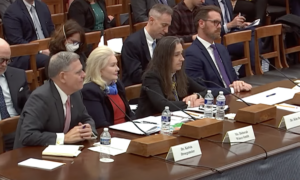
While fending off Chinese efforts to steal American technology remains top-of-mind, some lawmakers are excited about the recent scientific breakthrough involving fusion energy.
“It feels like this is a moonshot moment for us,” U.S. Rep. Jamaal Bowman (D-N.Y.) told fellow members of a congressional committee examining China’s technology threat.
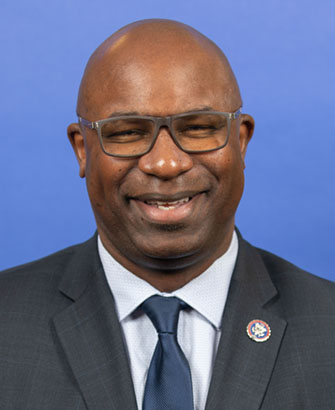
“And, we need a moonshot-style national effort to make fusion energy a reality,” he said at a Feb 28 hearing on Capitol Hill.
“Let’s move Heaven and Earth, an all-of-government approach, [with the] private sector. This is our moonshot moment.”
After a witness suggested he felt like applauding, Bowman said, “Are we allowed to clap in a hearing room? I think we should clap.”
Bowman then led the House Committee on Science, Space and Technology in a round of applause for accomplishments at the Lawrence Livermore National Laboratory.
A 60-year research effort paid off in December. “That [was] the first time in history that more fusion energy has been produced than the energy required to drive the experiment,” laboratory director Kim Budil told the committee.
Long-term Plan Needed
But the celebration of that achievement came with cautionary notes. Witnesses and lawmakers described significant challenges during the hearing entitled The United States, China, and the Fight for Global Leadership: Building a U.S. National Science and Technology Strategy…
The laboratory’s successful experiment, which the Epoch Times detailed previously, carries critical applications for national security, Budil said.
“The prospects for energy are real,” she said, “and they will require a whole-of-nation, private sector, public sector, community-based approach to advancing the science and technology here.”
The Livermore experiment’s decades-long journey to success shows that the U.S. needs a long-term plan for propelling its technology into the future, said Kelvin Droegemeier, a former director of the White House Office of Science and Technology Policy.
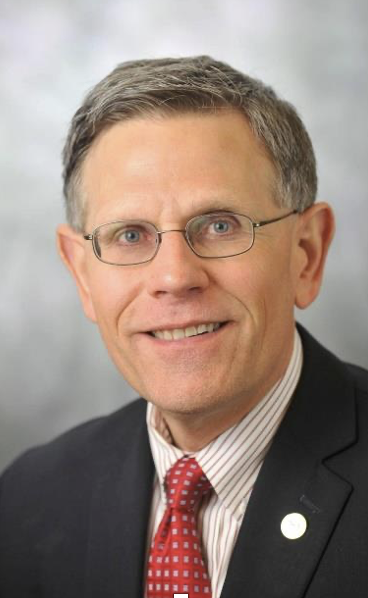
Although a four-year plan has advanced, a longer-range, 25-year outlook is needed—free of politics, Drogemeier said.
He said one of our nation’s biggest strengths is its free-enterprise system and the “interlocking” nature of academia, industry, nonprofits, and the federal government.
“It’s not perfect. It’s kind of clunky at times, but it works exceptionally well because the government does its role, but they leave to the scientific and the research community, the rest of the decision-making and what the priorities ought to be. And where the innovation actually happens,” Drogemeier said.
“That freedom is something that is super-attractive, and it’s one of the most important attributes that we have as a nation to wield against China in what it seeks to do in terms of global dominance.”
Avoiding ‘Valley of Death’
Deborah Wince-Smith, president and CEO of the Council on Competitiveness, described several examples of how American innovations have been caught in a “valley of death.” That term is often used when great ideas fail to be developed into usable products because they are “stranded in the lab,” the National Institute of Standards and Technology has stated.
She said that better coordination is needed among universities, government, and businesses to avoid that problem.
Wince-Smith noted that China has openly declared that it intends to overtake the United States “as the world’s technological leader and become the dominant economic, military, and geopolitical power.”
China wants “to shape the foundation, the standards, and the rules of the new age of innovation,” she said.
To stop that, America must make long-term, large-scale investments in its people and infrastructure, Wince-Smith said.
If that doesn’t happen, the nation will be crippled in its efforts to create high-value jobs and solve societal and environmental problems, she warned. “And very importantly, we will erode our geopolitical leadership and seriously damage our national security capabilities and power,” she said.
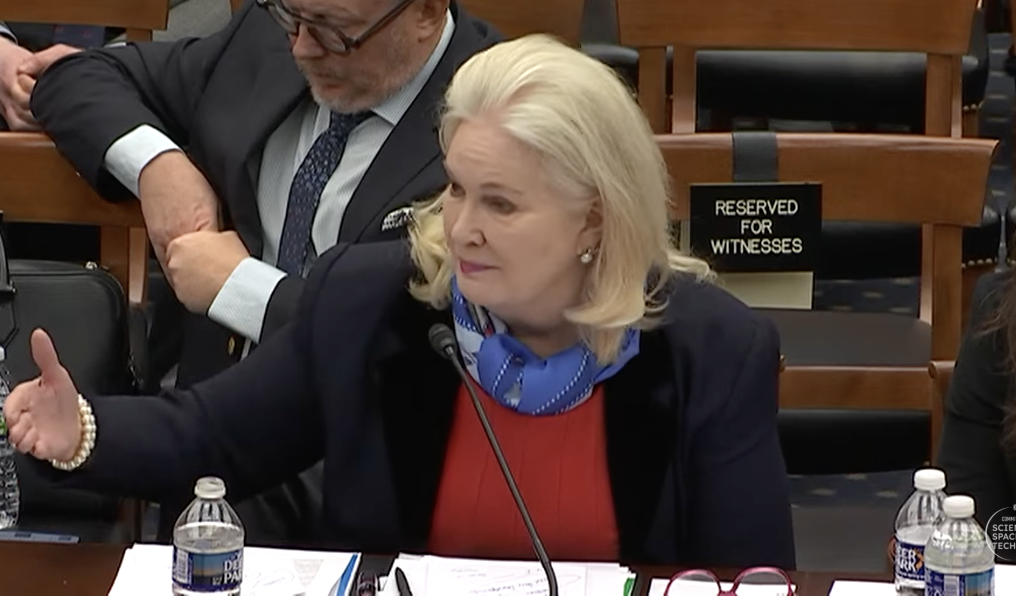
Washington vs. Beijing
Klon Kitchen, a senior fellow at the American Enterprise Institute, said American science and technology “continues to be the envy of the world.”
To maintain that standing, the nation must confront “Chinese technological theft and aggression” head-on, he said.
“Beijing, like Washington, understands that emerging technologies like artificial intelligence, advanced robotics, and quantum science will decisively shape tomorrow’s societies, economies, and battlefields,” said Kitchen.
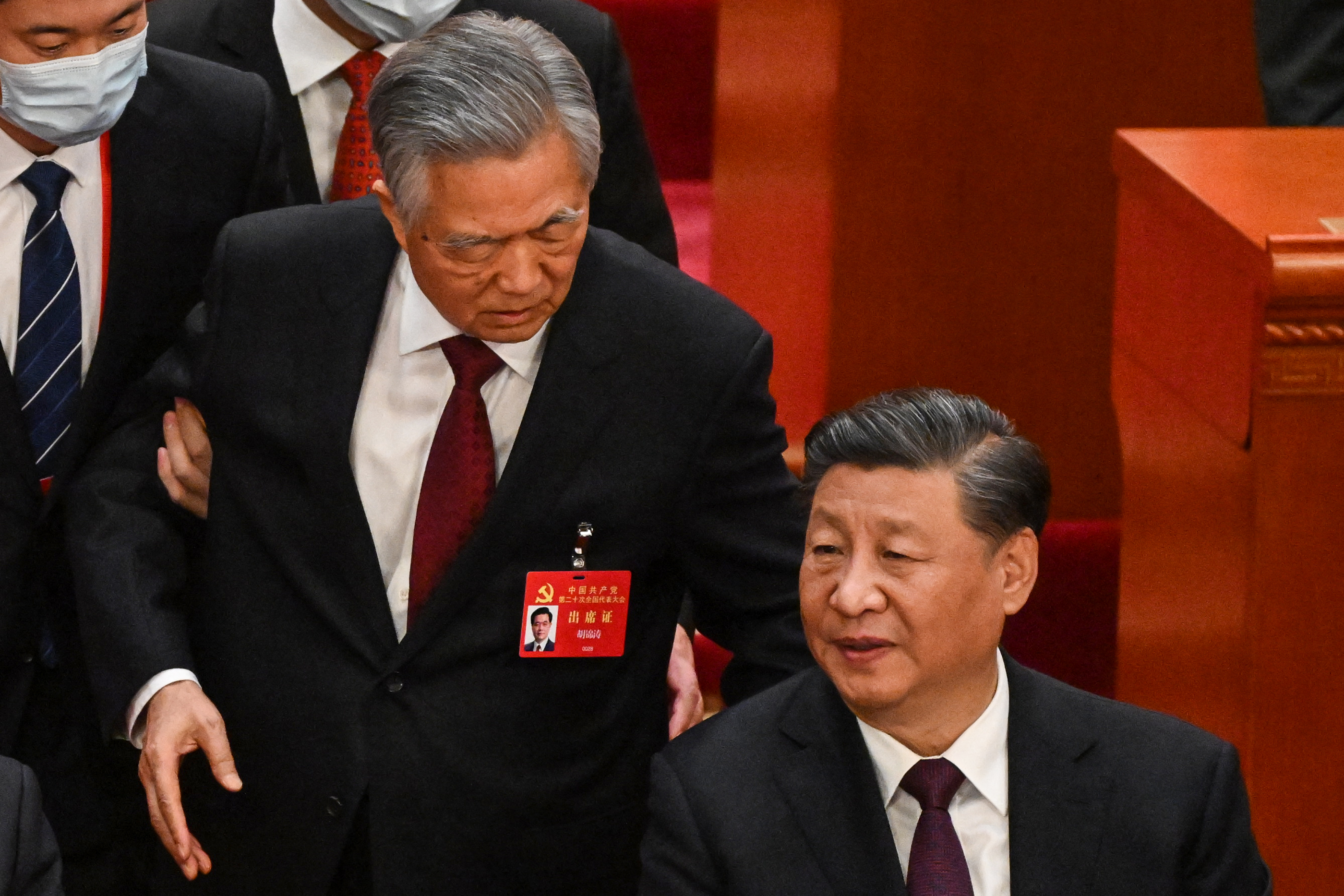
The Chinese Communist Party (CCP) is harnessing its innovation industry and “using it as an extension of the state for traditional and economic espionage,” he said.
As FBI Director Christopher Wray has pointed out, Kitchen said Chinese intellectual property theft “surpasses every other nation combined and represents one of the largest transfers of wealth in human history.”
“The U.S. science and innovation enterprise, which spans the public and private sectors, is hemorrhaging data and intellectual property,” Kitchen said, “and will be left decimated if these losses are not stopped.”
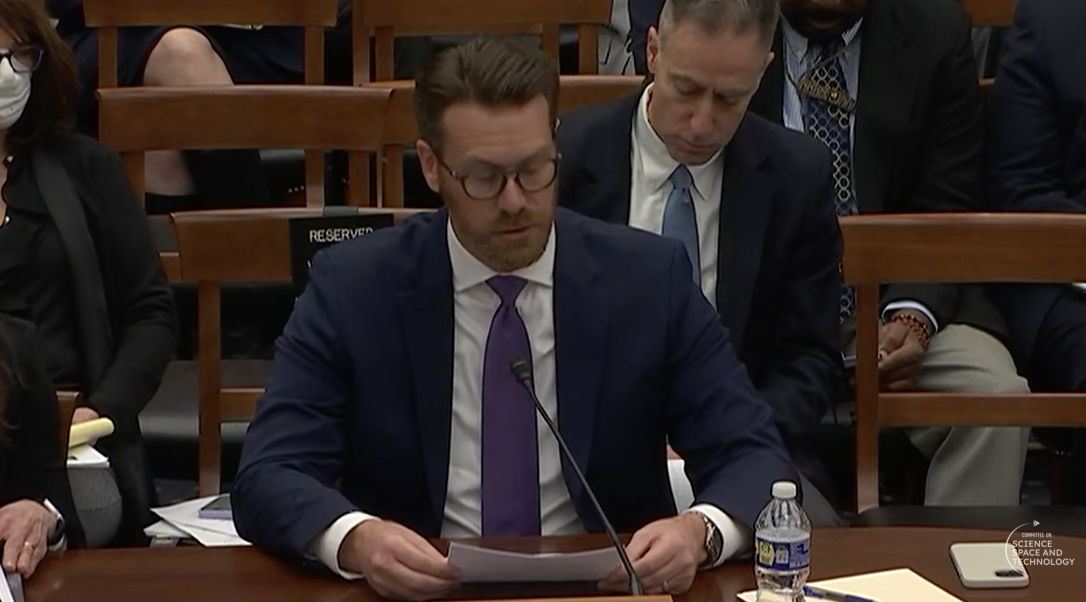

He suggests that the United States begin to strongly enforce its intellectual property rights and laws internationally.
By allowing Chinese technology companies in the U.S. marketplace, “we are being willingly robbed blind daily,” Kitchen said.
“I’m not accusing every Chinese-origin technology company of being malevolent. They don’t need to be malevolent; they simply need to be compliant with Chinese law,” he said.
Chinese law, he said, “is explicit and very clear … they require that every bit and byte of data that is collected by, transferred, stored on, or any other way touches a Chinese network” must be provided to the CCP.
“We need to recognize that and confront it,” Kitchen said. “If we want to begin to protect not only our intellectual property, and our individual data, there are some pretty obvious doors that we need to close.”
Allies’ Help is Needed
The nation also “must help our allies understand that a strategy of ‘regulate first and ask questions later’ will hurt, not help, all of us,” vis-a-vis the Chinese, he said.
“Pushing the frontiers of science and pioneering game-changing technologies is expensive. The resources and talent to do these things are precious and desperately scarce,” Kitchen said.
He said American companies that have succeeded in this realm should not be criticized for becoming too big. Instead, Kitchen said we should be thankful that our free-market economy has fueled those companies’ expansions.
“This uniquely American advantage may well be decisive in an era of escalating geopolitical competition. It would be reckless to give it away.”







